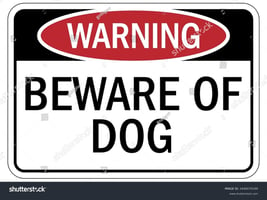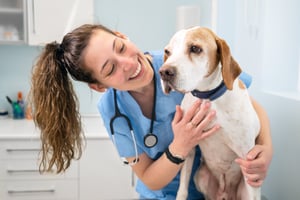Friends of the Cornell Riney Canine Health Center,
Caring for your Senior Dog - November 2025

Friends of the Riney Canine Health Center,
Thank you for joining our pack! I am Brian Collins, an extension associate for the Cornell Richard P. Riney Canine Health Center, and I’m pleased to share this month’s “From the Vet’s Desk” monthly health tip with our members.
I hope your fall is off to a great start and that your pets enjoyed a safe, and fun, (or quiet if that was their preference!), Halloween. November is notable for a number of dog-related observances including highlighting the needs of senior dogs all month. Who doesn’t love a senior dog -- with their graying muzzles, calm personalities and endless love and gratitude? Whether your dog has reached senior status or you’re considering adopting a senior from a local shelter or rescue group, it’s important to know that they often require adjustments in their care and may have additional medical conditions – but they’re well worth it!
Many of us dog owners are curious what our dog’s age would be in “human years.” In the past, there was a popular belief that it could be calculated by multiplying a dog’s age in chronological years by seven, meaning a two-year-old Pomeranian and a two-year-old Newfoundland would both be 14 in human years. However, a dog of 14 chronological years would be 98 in “human years” which would be impressive but not very realistic! Things get even more challenging when we don’t actually know a dog’s age, which is frequently the case with dogs from shelters or rescue groups. Veterinarians will try to estimate a dog’s age by looking at their eyes for signs of lenticular sclerosis (the haziness seen in the lenses) which can begin at around age seven (and eventually occurs in all dogs) and by the condition of their teeth – both of which can be quite variable. Scientists can help estimate age by measuring DNA methylation. A methyl group is a “functional group” composed of a carbon atom bonded with three hydrogen atoms which attaches to DNA and is involved in its regulation. Embark, a research partner of the Cornell University College of Veterinary Medicine, offers the Dog Age Test which uses this technology to provide your dog with an estimated age and birthday.
Though we don’t necessarily focus too much on a dog’s chronological age, it can be helpful in recognizing the stage of life that a dog is in so that we can make appropriate, care recommendations. The point at which we consider a dog a “senior” is somewhat arbitrary and is affected by their size and breed. A giant breed dog such as a Great Dane could be considered a senior at age six while a Chihuahua may not be a senior until their 11th birthday. What is most important is to develop a healthcare plan based on each dog’s individual needs. The American Animal Hospital Association has developed guidelines for addressing the health needs of dogs at each of four stages of life: puppyhood, young adult, mature adult and senior. The ten different categories are briefly described below:
- Lifestyle and safety assessment. Hearing, vision and mobility changes may require accommodations in the home environment to keep your dog safe and comfortable.
- Zoonotic disease. Could your dog have an infectious or parasitic disease that could affect your family? For example, the feeding of raw diets can increase the risk of certain diseases that could be shared between dogs and people.
- Behavior. Is your dog displaying signs of anxiety, noise phobias, or cognitive changes?
- Is your dog’s diet appropriate to address any known health conditions? Your veterinarian will assess your dog’s body condition score (BCS) and muscle condition score (MCS) to help determine if dietary changes are necessary. Approximately 50% of all dogs are overweight to varying degrees.
- Parasite control. It is recommended that dogs receive regularly administered preventive products to control external parasites (fleas, ticks) and endoparasites (heartworm, hookworms, roundworms). Blood and fecal testing may also be recommended to screen for parasitic infections including tick-borne diseases.
- Vaccine recommendations may change as your dog ages, but certain vaccinations such as for rabies will typically remain necessary throughout life, and others such as for Lyme disease, Leptospirosis, canine influenza and Bordetella may vary based on lifestyle. Routine antibody testing in lieu of vaccination is not recommended but may be useful in certain situations.
- Dental health. Does your dog need a thorough evaluation, dental cleaning and possibly even extractions? Are you able to perform home dental care?
- Reproductive status. The age at which your dog was spayed or neutered can influence the presence or age of certain conditions such as some forms of cancer, some orthopedic diseases, or urinary incontinence. If your dog is still intact, your veterinarian may make recommendations to pursue surgical sterilization.
- Breed-specific conditions. Many breeds have at least one associated genetic disorder so it’s helpful to be familiar with them. The Embark Dog DNA Test provides a breed breakdown (helpful for mixed breed dogs) and tests for known genetic health risks.
- Baseline diagnostic tests. It is helpful to obtain baseline information for your dog before they show signs of illness. These tests include a complete blood count, chemistry profile and urinalysis. In certain situations, and for certain breeds, this may also include imaging (radiographs and/or ultrasound exams) and EKG.
What else can we do to help our senior dogs live long, healthy lives? There are multiple anti-aging (or longevity) drugs being developed for dogs, and it is possible that one of them could receive conditional FDA approval in 2026. We’ll be watching for them closely. The hope is that they can improve health and extend the lifespan of dogs. However, in the meantime:
- Schedule at least two exams per year with your veterinarian.
- Discuss the categories above with your veterinarian and work together to develop a plan based on your dog’s individual needs.
- Call or visit your veterinarian as needed to discuss any concerns you have regarding any physical or behavioral changes you have noticed since your dog’s last veterinary visit.
As always, thank you for being a Riney Canine Health Center member. We look forward to catching up with you next month!
Dr. Brian Collins, D.V.M. ‘94
Discover expert tips, personalized advice, and friendly support from our Big Red Bark Chat AI Assistant! Visit our website today and give your furry friend the care they deserve.



-1.jpg?width=50&name=Aly%20in%20RCHC%20shirt%20(+%20Mishka)-1.jpg)

